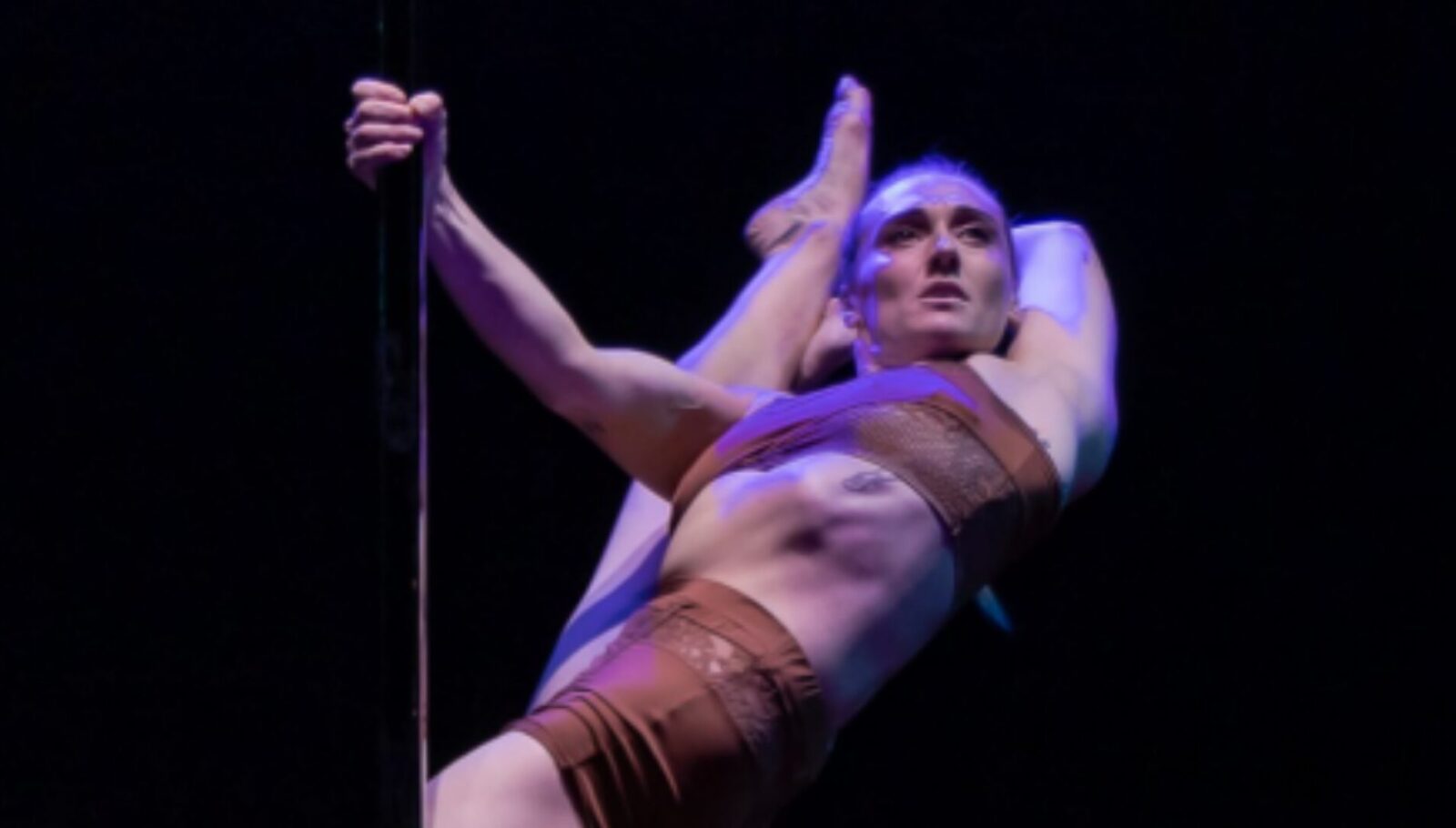Sophie Duncan: Pole, Circus, and Survival of the Friendliest

Host Anna Robb sits down with Sophie Duncan, an award-winning creative director, choreographer, and performer whose work spans theatre, circus, film, radio, and special events.
From Dragone’s The House of Dancing Water to Cirque du Soleil, international competitions, and collaborations with Florentina Holsinger, Sophie has carved out a unique voice in the evolving art of pole and performance. With 11 pole titles, a teaching role at the National Centre for Circus Arts, and her own podcast, she continues to push boundaries while honoring the diverse roots of her craft. In this conversation, Sophie reflects on reinvention, creative risk, and why “survival of the friendliest” may be the truest key to a lasting career in the arts.
Enjoy this candid and inspiring glimpse into their conversation—the full episode drops next week.
How did Sophie Duncan find her way from dance into circus and ultimately pole?
Sophie began as a dancer and creative who hadn’t “registered” circus until joining Dragone’s The House of Dancing Water. Her first visceral encounter was seeing four straps artists flying to thunderous music—an image that rewired her sense of possibility. After several years with Dragone, an unexpected pause on a Macau project (Destiny) left her with time and a pole studio next door. At 27, she walked into class a beginner—strong musicality and performance instincts, but no pole vocabulary or acrobatic background. She embraced being a novice, taking privates, then group classes, relishing the humility and community of “muggle” lessons. A studio showcase birthed a comedic “drunk” character that kept returning in later routines. That video led to a Hong Kong competition she won—then more comps, then 11 titles, and within two years, a Cirque du Soleil contract as a lead character and dance captain.
What draws her to pole, and how does she situate it among its different lineages?
Sophie candidly admits she once dismissed pole as “girly”—a bias she now calls out in herself. Today she frames pole as a platform, like a vertical stage that expands levels, storytelling, and invention. She loves its youth: every week new tricks, aesthetics, and hybridizations appear. Crucially, she honors the form’s roots: the strip-club lineage is real, proud, and inseparable from pole’s history, even as some try to obscure it. Pole also intersects with Malakhamb (India) and Chinese pole—circus traditions that “own part of it” too. Sophie works in the fertile middle: theatrical pole that tells stories, sings, hosts a podcast, and competes. The multiplicity can clash (sport vs. art vs. sex work vs. circus), but that “chaos” energizes her. Pole became the discipline she longed for: a canvas where dance training, character, voice, and physical risk entwine.
How did opportunities with Cirque arrive, and what role did relationships play?
In a career “abyss” after Dragone, Sophie Duncan proactively networked—genuinely. A conversation with Mukhtar Sharif (then at Cirque) traced back to his visit to Macau and shared London ties; years later he messaged: “Are you free for Andorra?” That summer show opened doors to a larger Cirque ecosystem and to stage manager Gab Dupuis, with whom she bonded over the loss of their fathers—reminding Sophie how family and grief inflect our performing lives. As her pole work matured, Gab kept watching; soon Cirque asked for fresh material and offered a cruise-ship contract where she led as character, pole soloist, and dance captain—the “dream job.” COVID collapsed that momentum just as she was being considered for choreography/cleaning roles across ships, but the lesson endured: authentic curiosity, kindness, and keeping in touch create long arcs. “Survival of the friendliest,” she says—the people you’d gladly call again are the ones who progress with you.
What is Florentina Holsinger’s world, and how did it transform Sophie’s practice?
Through a CircusTalk listing, Sophie auditioned for Florentina Holsinger—a director staging radical, female-led, often nude ensembles that merge stunts, singing, dance, and conceptual provocation. In Ophelia’s Got Talent (Volksbühne, Berlin), Sophie built an aerial-pole piece inspired by Last Breath—embodying a diver lost in the abyss. The company swims, tap-dances, flies to a “helicopter,” and performs naked—not as shock, but as unadorned materiality. Sancta (the opera that “went viral”) confronts Catholic imagery with blood work, a robot, and graphic tableaux—“not mocking faith,” she says, but showing what it literally depicts. The new Year Without Summer explores aging female bodies; it opens with a 20-minute non-simulated orgy, performed tenderly across generations—including the “BOPs” (Birds of Paradise), women aged ~78–84. For Sophie, this world demanded vulnerability, consent literacy, daily check-ins, and acting presence. Compared with Cirque/Dragone’s polished perfectionism, Holsinger’s theatre pursues “perfect wrongness”—punk, trashy, exacting in its own way—and profoundly expanded Sophie’s artistic range.
What principles guide Sophie now—on safety, culture, bias, and being a good colleague?
Safety: She carries Dragone/Cirque instincts (checks, rigging sense) into new rooms, advocating calmly where needed while respecting each company’s culture. Cultural intelligence, she says, is arriving in “someone else’s church” ready to learn the rites before offering improvements. Bias: She names and sheds her own—especially the early prejudice against pole’s sex-work roots—because closing off lanes would have erased her biggest opportunities. Vulnerability: Every stage asks for it; Holsinger’s work simply makes that request explicit. Teamwork: Despite frequent nudity and charged content, the technical teams have been respectful; she refuses simplistic “men vs. women” narratives and highlights skilled allies of all genders. Career ethos: Reinvent regularly, keep your core values, and let layers accrete or fall away as you grow. Above all, be kind and competent. People who are brilliant and friendly get called back. Or, as she signs off with a grin: think like dogs—evolve by cooperating.
Key Takeaways:
Reinvention comes from curiosity—Sophie embraced pole at 27 and turned it into a career.
Pole’s roots span strip clubs, circus traditions, and sport; its diversity fuels creativity.
Genuine relationships (not networking games) opened doors to Cirque and beyond.
Dragone and Cirque demand polish; Florentina Holsinger thrives on “perfect wrongness.”
Vulnerability, respect, and kindness—the “survival of the friendliest”—sustain a career.
Editor's Note: At StageLync, an international platform for the performing arts, we celebrate the diversity of our writers' backgrounds. We recognize and support their choice to use either American or British English in their articles, respecting their individual preferences and origins. This policy allows us to embrace a wide range of linguistic expressions, enriching our content and reflecting the global nature of our community.
🎧 Join us on the StageLync Podcast for inspiring stories from the world of performing arts! Tune in to hear from the creative minds who bring magic to life, both onstage and behind the scenes. 🎙️ 👉 Listen now!
